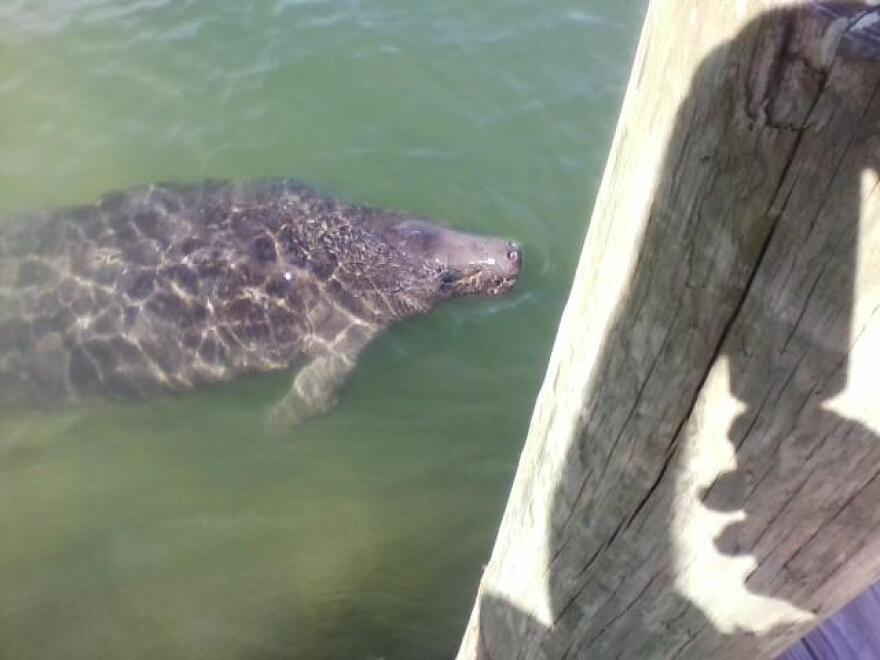As temperatures fall and water temperatures cool, cold stunning can occur in sea turtles and manatees that haven't migrated south for the winter. Volunteers are prepared to rescue, rehabilitate and relocate marine life impacted by cold stunning.
Last winter, a record number of cold stunned sea turtles washed up on North Carolina beaches. More than 1,900 were rescued during the month of January alone. Coastal Wildlife Diversity Biologist with the Wildlife Resources Commission Sarah Finn says water temperatures plummeted by 20 degrees in the first five days of January, and the sea turtles weren’t able to migrate out of the area in time.
“that was a lot to do we think with the mild fall and winter that we had last year where we didn’t see any cold stunning that we typically see in November or December, water temperatures just didn’t get cold enough. So that kind of encouraged the turtles to hang around, they were still able to forage, waters were in the 60s in December which is really strange.”

This year, several hundred volunteers with the North Carolina Sea Turtle Project are ready to assist with rehabilitation. They’ll also be patrolling the coastline this winter searching for cold stunned turtles. Finn says there haven’t been any reported cases in North Carolina… yet.
“We’re supposed to be getting a drop in temperatures later this week so likely this weekend, we may see some.”
Wind direction and current also play a role in cold stunning, which typically occurs in inshore waters like the Pamlico Sound, Core Sound and Cape Lookout Bight. Finn didn’t want to hazard a guess as to what this season may hold. Though, she says there’s been a more gradual transition from cool autumn temperatures into winter.
“It’s kind of nudging those turtles to think ‘hey, it’s time to migrate’ and so we won’t see as big of numbers, but it’s always hard to predict what we’ll be dealing with until we’re in the thick of it.”
The Karen Beasley Center in Surf City, the STAR Center in Manteo and the North Carolina Aquarium Network are involved with rehabilitation. Finn says these organizations care for an average of 100 or more sea turtles each season.

Sea turtles aren’t the only animal that struggles in cold water off our coast. Manatees have been spotted as far north as Connecticut during the summer. Scientists don’t know exactly what causes them to migrate so far from their native waters but it may have something to do with competition for food sources. Research technician with the University of North Carolina Wilmington Erin Cummings says manatees start making their way back to Florida as temperatures fall.
“In North Carolina, manatees should start moving south around the end of September or October. They should be out of our area by November.”
Manatees that don’t move out of the area in time are particularly vulnerable to cold stress syndrome, becoming torpid, incapable of swimming, unable to digest food and develop lesions on their skin. Manatees in this condition will die if they aren’t rescued and given proper treatment. Cummings says cold stress starts to set in as waters temperatures dip below 68 degrees.
“In southern North Carolina, temperatures are around 60 degrees, 61 degrees. The Outer Banks area, right now, is about 58 degrees. So it’s definitely too cold.”
There were ten manatee sightings at the end of October and three in November. The most recent report came in on December 2nd and Cummings says the manatee was exhibiting signs of cold stress. She says it’s likely that more are out there.
“We have a couple power plants in our area, where manatees possibly be using. Areas of warm water discharges. We’re not sure because manatees should definitely not be here at this time but they may be potentially seeking out warmer waters.”

Even though manatees are an endangered species, sightings along the North Carolina coast aren’t entirely rare. There were 17 in 2011. That number increased to 30 sightings in 2012. The upward trend hasn’t stopped. This year, there have been 49 sightings so far, the highest year on record.
If you spot a manatee that’s showing signs of cold stress, Cummings says to keep your distance and report it as soon as possible to the Marine Mammal Stranding Program at UNCW.
“And that number is 910-962-7266. That will allow us to contact Fish and Wildlife and see what we can do about potentially transporting that manatee back to Florida if it is exhibiting signs of cold stress or if it’s injured, we can make steps to do what we need to do to help that animal.”
More active steps can be taken if you encounter a cold stunned sea turtle. Wildlife Diversity Biologist Sarah Finn says the first step is calling their emergency hotline at 252-241-7367.
“The one thing that we want them to not do is warm the turtle up in any way at all. I know your first instinct is to say oh, the turtle is really cold, we should warm it up pretty quickly, but that’s actually really harmful. So the best thing to do is to call that number, get some instructions, we’ll likely instruct them to get it out of the wind or out of the water if they can, just a sheltered area, a garage or something like that until we can get one of our volunteers to them and retrieve the turtle.”



